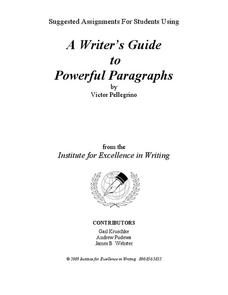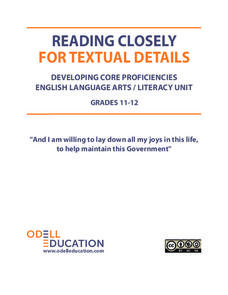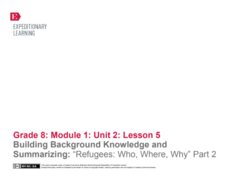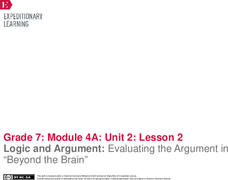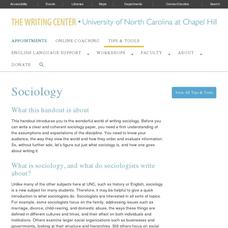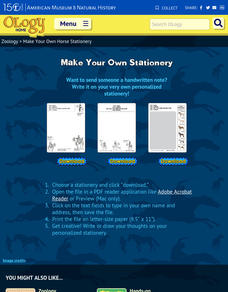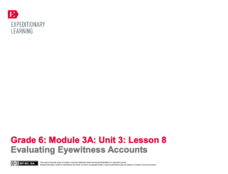Institute for Excellence in Writing
A Writer’s Guide to Powerful Paragraphs
When it comes to teaching writing, it helps to start small. A supplementary guide to A Writer's Guide to Powerful Paragraphs provides suggested activities to help writers craft a variety of paragraphs. Each assignment covers a specific...
Novelinks
The Lightning Thief: Concept/Vocabulary Analysis
Before you begin reading Percy Jackson and the Lightning Thief by Rick Riordan, read over this comprehensive handout that gives you a plethora of information regarding the story's summary, organizational structure, central...
University of North Carolina
Qualifiers
A lot of writers really struggle very much with adding a lot of qualifiers and intensifiers in their writing. Part of a larger series to improve writing skills, a handout on the topic provides tips to help reduce a reliance on these...
Odell Education
Reading Closely for Textual Details: "And I am willing to lay down all my joys in this life..."
Look closely, some details are hidden! Scholars learn how to find attributes by first examining characteristics in illustrations and then move to locating details in text with close reading. The teacher models good practices for...
Curated OER
8th Grade Reading Comprehension Success
Augment your eighth grade language arts curriculum with a thorough set of reading comprehension activities and assessments. Focusing on a variety of skills, including vocabulary in context, text structure, main idea, and author's style,...
EngageNY
Building Background Knowledge and Summarizing: “Refugees: Who, Where, Why” Part 2
What are some universal aspects of refugees' experiences worldwide and throughout history? Scholars read the text "Refugees: Who, Where, Why" and create two class anchor charts. Finally, they each write a paragraph that provides an...
EngageNY
Logic and Argument: Evaluating the Argument in “Beyond the Brain”
The brain is not the mind. Scholars explore the claim by reading an informational article about neuroscience research, "Beyond the Brain." As they read, they answer text-dependent questions and complete an anchor chart to evaluate...
University of North Carolina
Verb Tenses
Twelve categories of verbs exist in the future tense, ranging from simple present to future perfect progressive, but only three have a place in academic writing. Those three tenses make up the content of an informational handout that...
University of North Carolina
Sociology
What exactly does sociology entail? Sociology is a broad field that covers many topics, including culture, mass media, and social movements. A helpful handout prepares scholars for typical writing found in college-level sociology...
College Board
2016 AP® English Language and Composition Free-Response Questions
When it comes to testing, practice makes perfect. A set of free-response questions from the AP® English Language and Composition exam help writers prepare for the test. Three different prompts cover topics such as monolingual English...
EngageNY
Building Background Knowledge: The Impending Fall of Saigon
Scholars read "Doc-Lap at Last" and participate in a Three Threes in a Row activity in which they answer three questions about the text in their rows. They then discuss the central idea of the text. Readers finish the lesson plan with a...
EngageNY
The Authorship of Shakespeare: “The Shakespeare Shakedown”
Pupils conduct a close reading of "The Shakespeare Shakedown" by Simon Schama, and identify evidence the author uses to support his claims. Finally, they discuss and answer text-dependent questions before completing a Quick Write about...
American Museum of Natural History
Make Your Own Horse Stationary
Write a letter on horse-themed stationery. Three pages to choose from showcase a variety of horses and the history of horseback riding.
Elizabeth Murray Project
Colonial Women During the Revolution
Young researchers use the Internet or books to find out about colonial women during the American Revolution. They organize information in a graphic to demonstrate their understanding of the research they gathered before writing a...
University of North Carolina
Statistics
Let's see you back it up! As shown in the 18th handout in the Writing the Paper series of 24 lessons from UNC, statistics help form an effective argument. The handout discusses how to analyze a source and break down the data to ensure it...
EngageNY
End of Unit Assessment: How Word Choice Contributes to Tone and Meaning
It's finally time for pupils to show what they know! Scholars finalize the unit with an end-of-unit assessment. They use the book Inside Out & Back Again and the "Forgotten Ship" transcript to examine word choice, tone, and...
EngageNY
Finishing Who? Where? and Why? Research
Who? Where? Why? Scholars answer these questions to help identify the gist of Inside Out & Back Again. First, they add text evidence to their research folders. They then begin looking at a performance task in which they write their...
EngageNY
Analyzing the Central Claim and Supporting Claims: “The Shakespeare Shakedown”
Scholars continue to analyze Simon Schama's article "The Shakespeare Shakedown." They participate in a jigsaw discussion to identify the author's argument and supporting claims. Pupils also write objective summaries of the text.
EngageNY
Evaluating an Argument: “Is Google Making Us Stupid?”
Does the Internet negatively affect peoples' brains? Scholars complete a Tracing an Argument note catcher to evaluate the question as they read the text "Is Google Making Us Stupid?" Exploring both sides of the issue, they add their...
EngageNY
Using Effective Search Terms: Researching Screen Time
The proof is in the reading. Scholars read an article, "Attached to Technology and Paying the Price," and answer text-dependent questions. Next, they complete a Venn diagram to contrast two authors' use of evidence on the topic of screen...
EngageNY
Mid-Unit Assessment: Notes and Graphic Organizer for a Letter to a Publisher
It's the halfway point! Scholars complete a mid-unit assessment to showcase their knowledge and skills so far. They create a graphic organizer, write an opinion about how their athlete created a legacy, and then record the best reasons...
ESL Holiday Lessons
Bastille Day
Eleven worksheets follow an informative reading about Bastille Day. Scholars complete sentences found in the reading by matching, filling in the blanks, and choosing from a series of multiple-choice questions. Participants spell and...
EngageNY
Evaluating Sources, Continued: The ONLINE EDUCA Debate 2009 (Part 2 of 10)
Watching videos and playing online games can be educational, but too much screen time has its drawbacks. Pupils watch a video about the topic and write down the claim, reasons, and evidence in support of reduced screen time for children....
EngageNY
Evaluating Eyewitness Accounts
That sounds like a plan! Scholars complete the Newspaper Article Planning graphic organizer to understand the process of writing a newspaper article. They also use what they learned about researching factual information and gathering...


